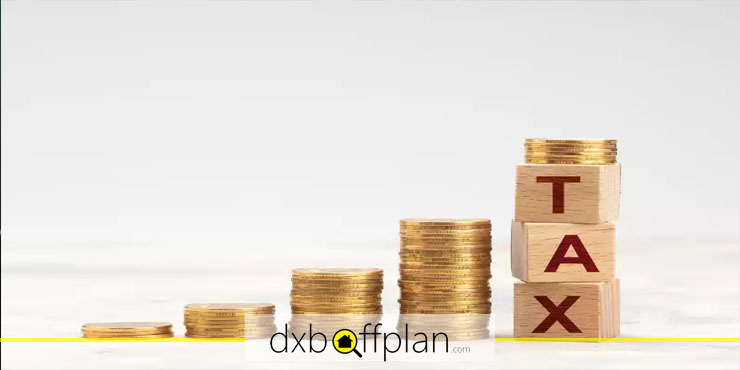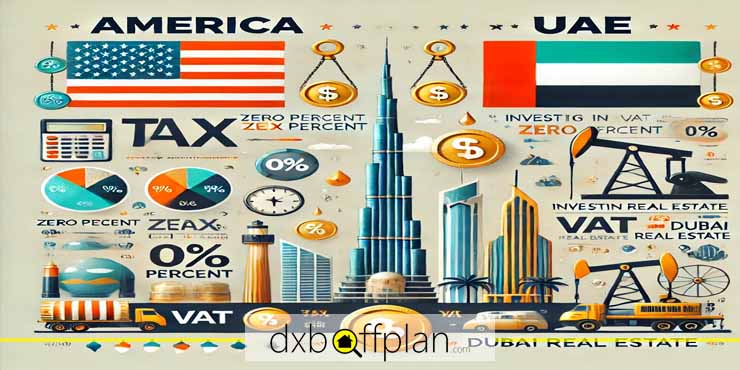Comprehensive Guide to Dubai Tax System
In the past few years, Dubai, like the economic hub of any other region, has seen some major changes in tax policies. From the implementation of Value Added Tax (VAT) in 2018 to that of Corporate Tax in 2023, all these policies not only made the UAE compliant with international tax guidelines but also introduced transparency and sustained boom in the economy.
But this newest trend raises some concerns in the minds of businessmen. With the current business climate where changes in tax policies and rules can make all the difference to the persistence of business and your profits’ margins, precise and updated information about the tax policies of the UAE becomes more significant than ever before. If you are an entrepreneur with ambitions to open a business in Dubai or an experienced manager with determination to keep your company in compliance with the newest rules, this article by Dxboffplan has been written specifically and exclusively for you.
In this article, we approach the Dubai Tax System in straightforward and pragmatic ways, from ground rules to statutory obligations and present tax optimization potential.
Introduction to Types of Taxes in Dubai
Dubai, with pride in having one of the largest bustling business hubs in the globe, presents the perfect platform for business incorporation, trade, and investment with clear and shrewd tax policies. Contrary to the innumerable number of countries in the globe, the Dubai Tax System are straightforward, reasonable, and rich in benefits to firms and businessmen. Here is their Overview of Taxes in Dubai (2026):
| Type of Tax | Rate / Rule |
| Corporate Tax | 9% on profits above AED 375,000; 0% for income below AED 375,000 |
| Value Added Tax (VAT) | 5% on most goods and services |
| Excise Tax | 50% on sugary drinks; 100% on energy drinks and tobacco products |
| Customs Duties | 5% on most imported goods; exemptions in free zones |
| Personal Income Tax | 0% – no tax on salaries, wages, dividends, or bonuses |
| Housing & Rental Fees | ~5% of annual rent (added to DEWA bill); 4% property transfer fee on sales |
These are the same qualities that made Dubai the perfect destination to invest in in the UAE. Here we will outline the tax categories that are:
Taxe Corporatif
The corporate tax is the first direct tax in the country. It is directly levied on businesses’ net profits. Firms with income of more than AED 375,000 will be taxed at 9% rate.
Tax was introduced to make the economy more transparent and in balance with international standards but with one of the lowest percentages in the globe to still remain in consideration. We must not forget that small companies with income below the bar are still exempted at a rate of 0%. Some entities such as government entities, natural resource sector industries, and special situations free zone entities are exempted from tax.
Value Added Tax (VAT)
Value Added Tax or VAT in the Dubai Tax System became settled since the beginning of 2018 and stands at a standard rate of 5% tax levied upon the greater number of goods and services. VAT is an indirect tax that is paid from the final consumer but the obligation to register, declare, and pay lies with companies. Registration is mandatory for companies that generate more than AED 375,000 in revenue every year and these companies with monthly turnover that falls between AED 187,500 and AED 375,000 are voluntarily registered. Simplification of process, computerization of the tax system, and availability of special free zones that are taxed differently made VAT in Dubai straightforward and easy to administer.
Excise Taxes
Excise tax plays its share in restricting the usage of products that are dangerous to public health, like energy drinks, tobacco products, and sweet drinks. This tax levies in the production sector and wholesale and takes its due in the final price to the consumer in the market directly. Tax rate in energy drinks and tobacco products and in sweet drinks is 100% and 50% correspondingly. This financial tool, apart from filling national treasuries with revenues, attempts to ensure better public health and restrict diseases caused due to consuming these products. Registration and payment of the due tax are due for all importers and producers and distributors of these products.
Customs Duties
Since this town is one of the key commercial centers in the region, the Dubai Tax System in general imposes a 5% custom duty rate when import products are introduced. This general rate targets the majority of products that are imported to the mainland within the UAE. Some special products are levied higher than this rate, including alcoholic drinks and tobacco products. Dubai’s key feature in this respect includes that they are offered special free areas where import products of any type are exempted paying custom charges, with the condition that they will not be transferred from the area and end up in the mainland. This practice assisted in attracting import and distribution firms and made Dubai a regional headquarters for import, storage, and re-exporting products.
Personal Income Tax
One of Dubai tax system’s positives includes no personal income tax, one of the largest plus points in getting a UAE residency visa. Salary, wages, bonuses, dividends, and all kinds of personal income are exempted from Dubai tax and not paid to the Dubai government by Dubai citizens and residents. This approach made Dubai more appealing to the skilled workers of the entire world to emigrate to Dubai and favors personal savings and personal quality of life to citizens and Dubai residents in equal measure. As in any advanced country, a great portion of personal income paid to the government in these countries, Dubai, excluding this tax in full measure, prepares ideal conditions to live and work. If you intend to emigrate to the UAE with a work visa and open up your professional practice in Dubai with the status of a foreign expert, information about the tax system counts as one effective first step to success.
Dubai Housing and Rental Tax
Whereas in other nations, Dubai levies no rent receipt tax directly. But renters and owners are to pay a sort of fee in the name of “municipality fee” in the form of a property-based indirect tax. This fee levies an amount in proportion to the rent paid within the span of a year and accompanies the electricity and water meter bill raised through Dubai Electricity and Water Authority (DEWA). This fee in Dubai levies the amount equivalent to about 5% of the rent within a year in the case of renters and can be more in the case of business ventures. When buying a property, tax in the name of “transfer fee” comes up and levies 4% of the worth of the property and paid when registering the ownership deed. These expenses are lower than in other nations’ tax levies in any property, but they are considerable enough to be known to the renters and financers to make suitable fiscal plans.
Key Tax Obligations for Businesses in Dubai
In the context of prevailing the Dubai Tax System today, all business entities must keep in step with the tide of legal obligations and rigid rules. Registration with the tax system, tax payment in the proposed manner, bookkeeping in accounting books, and periodic reporting are a few such obligations. Not adhering to these obligations can come with hefty penalties, tax audits, and shame to the company image. Due compliance with these obligations not only reduces legal complications but are the cornerstones of healthy growth and gaining market trust in the UAE.
Registration and Compliance
Each Dubai business must be registered with the Federal Tax Authority (FTA) for the purpose of corporate tax. But only businesses that make more than the sum of AED 375,000 in taxable profit within one year will be required to pay at the rate of 9%. Registration must be done through the tax authority web portal and up to the company’s accounting period due date.
For VAT, you must register your earnings and if it’s more than AED 375,000 in a year. Company tax returns must be submitted within 9 months after the end of the financial year.
VAT returns, based on the turnover figures of the company, are filed monthly or every quarter in general. Failure to honor deadlines will earn you significant penalties that start at AED 1,000 in the first offense and continue to rise with repeated offenders.
Reporting Obligations
Maintaining up-to-date and accurate records of taxable income, expenses, and transactions for tax compliance are also required. Special returns are required to be filed accurately with clear demarcation of input VAT (purchased) and output VAT (sales) with appropriate reconciliation. Company tax returns are to be generated with appropriate accounting statements in accordance with international accounting standards and are to be submitted with records of expenditure and exemptions.
The largest companies in this country are required to make VAT returns submissions every month, and small companies make VAT returns submissions every quarter. Meeting these requirements in making submissions minimizes instances of tax audit and possible punishment and inhibits disruption of the business process. With tax consultancy and accounting services, among others, other than Dubai’s biggest banks, companies are helped make appropriate financial statements, account administration, and compliance with guidelines.
Most Common Mistakes in Company Tax Return in UAE
In spite of clear rules in the Dubai Tax System, numerous companies in the UAE are making mistakes that are grand scale costly. These are:
- Inaccurate or Incomplete Records: Inaccurate data entry into the tax books will produce wrong tax figures, tax audits, and levies. These books and other supporting documents like receipts and invoices must be kept with precision and for a minimum of five years.
- Errors in Misclassifying Expenses: Error in accounts for expenses, like in misclassifying entertainment expenses may inappropriately elevate taxable income. There should be actual costs paid and reported in business.
- Missing Deadlines: Failure to register or to lodge returns within deadlines will incur significant penalty charges. Businesses are required to register with the FTA after they qualify.
- Incorrect Tax Calculations: Miscalculations of tax in arrears are often the result of misinterpreting exemptions or paying the wrong rate of tax. Constant verification and cross-reference to experts can prevent such mistakes.
- Inability to Account for Tax Incentives: Very few companies enjoy exemptions like tax relief in small enterprises or exemptions granted in free areas. Accounting for these will create major savings in terms of money.
- Related-Party Transactions: All Payment with directors or shareholders should be reasonable and market-value-based with due documentation to evade any type of litigation.
Dubai in Comparison to Foreign Nations with Regard to Tax: Why Dubai Is So Appealing
Comparatively to numerous countries in the world, particularly countries in the West, the Dubai Tax System has huge exemptions that are making the town quite popular among businessmen and investors. While in numerous countries in the world, particularly countries in the West, personal income tax, inheritance tax, and heavy company tax are levied, Dubai abolished all personal tax and levies low 9% company tax so that tax levied from business entities stays to the bare minimum. Moreover, availability of no withholding tax and company and ownership of immovable properties in Dubai’s free zone areas has allowed rapid growth of business. Here is a closer look:
| Country / Region | Corporate Tax Rate | Personal Income Tax Rate | VAT / Sales Tax |
| Dubai (UAE) | 9% (above AED 375,000) | 0% | 5% VAT |
| United States | 21% (federal) + state | 10% – 37% (progressive) | Varies by state (0%–10%) |
| United Kingdom | 25% | 20% – 45% (progressive) | 20% VAT |
| Germany | ~30% (corporate + trade) | 14% – 45% (progressive) | 19% VAT (7% reduced) |
| Singapore | 17% | 0% – 22% (progressive) | 8% GST (rising to 9%) |
The benefits of the Dubai Tax System we mentioned, along with stability in the economy, clear rules and facilitative policies, are making Dubai one of the best areas in the world to live in, work in, and invest in.
Final Words
Because of having a simple, uncomplicated, and reasonable tax system, Dubai today sits in the world’s top favourite venue to register companies and make investments. The shrewd combination of tax policies make Dubai a rock-solid, attractive, and competitive playing ground for investors. But to successfully navigate through the Dubai Tax System, having the expertise, latest registration, continuous reporting, and judicious exercising of exemptions are required. Fulfilment of these not only prevents penal action and litigation but also paves way to long term success and sustained business respectability. In order to invest in Dubai with maximum ease and confidence, acquaintance with Dubai’s tax system first and foremost plays a key role in aiding you to be successful. Contact us at Dxboffplan and enjoy our experience, expertise, and professional consultancy services in Dubai’s business and real estate market. If you need accommodation options while in Dubai, we will assist you on every step of the way with absolute trust, latest property prices in Dubai and free consultation.
frequently asked questions
No, Dubai does not have any personal income tax on salaries, wages or bonuses.
As of 2023, Dubai has introduced a corporate tax of 9% on businesses earning over AED 375,000 in a year. Some entities working in free zones may be exempt.
Corporate tax returns must be filed within 9 months after the end of a company’s financial year. VAT returns are generally submitted either monthly or quarterly.










